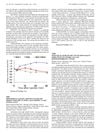 8 citations,
July 2022 in “Biomedicines”
8 citations,
July 2022 in “Biomedicines” Autophagy helps keep skin healthy and may improve treatments for skin diseases.
1 citations,
January 2024 in “Journal of personalized medicine” Hormonal imbalances during menopause may significantly contribute to Frontal Fibrosing Alopecia.
March 2024 in “Cosmetics” New regenerative techniques show promise for improving skin, healing wounds, and growing hair.
 19 citations,
January 1987 in “Dermatology”
19 citations,
January 1987 in “Dermatology” Minoxidil slows down skin cell growth and may help treat scars and skin conditions.
1 citations,
March 2023 in “Pharmaceutics” PBMCsec can help reduce and improve thick skin scars.
 1 citations,
October 2020 in “The Egyptian Journal of Histology”
1 citations,
October 2020 in “The Egyptian Journal of Histology” Ginseng was more effective than finasteride in treating enlarged prostate in rats.
 September 2023 in “Medicine”
September 2023 in “Medicine” The research suggests immune system changes and specific gene expression may contribute to male hair loss, proposing potential new treatments.
 March 2024 in “EMBO molecular medicine”
March 2024 in “EMBO molecular medicine” Antiviral drugs, especially daclatasvir, may be a new treatment for a rare skin disease, improving survival and reducing symptoms in mice.
 32 citations,
January 2005 in “Advances in Biochemical Engineering / Biotechnology”
32 citations,
January 2005 in “Advances in Biochemical Engineering / Biotechnology” Fetal wounds heal without scarring because of different biological factors, which could help improve adult wound healing.
32 citations,
July 2017 in “Molecular diagnosis & therapy” MicroRNA-21 could help diagnose and treat skin fibrosis.
31 citations,
November 2020 in “International journal of molecular sciences” Adipokines affect skin health and could be targeted for treating skin diseases.
 35 citations,
August 2021 in “npj Regenerative Medicine”
35 citations,
August 2021 in “npj Regenerative Medicine” Fibroblasts, cells usually linked to tissue repair, also help regenerate various organs and their ability decreases with age. Turning adult fibroblasts back to a younger state could be a new treatment approach.
 11 citations,
August 2017 in “Journal of Chromatographic Science”
11 citations,
August 2017 in “Journal of Chromatographic Science” The new method is rapid, sensitive, and accurate for evaluating the quality of the medicinal herb Platycladi cacumen.
 1 citations,
September 2022 in “Nepal journal of dermatology, venereology & leprology”
1 citations,
September 2022 in “Nepal journal of dermatology, venereology & leprology” Apremilast shows promise for several skin conditions but needs more research.
 April 2010 in “The Journal of Urology”
April 2010 in “The Journal of Urology” Human prostate cells produce more WISP1/CCN4 when there's not enough oxygen.
 35 citations,
October 2012 in “Dermatologic Clinics”
35 citations,
October 2012 in “Dermatologic Clinics” Autoimmune diseases can cause hair loss, and early treatment is important to prevent permanent damage.
 5 citations,
September 2022 in “Research Square (Research Square)”
5 citations,
September 2022 in “Research Square (Research Square)” CD201+ fascia progenitors are essential for wound healing and could be targeted for treating skin conditions.
 109 citations,
December 2003 in “American Journal of Pathology”
109 citations,
December 2003 in “American Journal of Pathology” Fetal wound healing changes with development, affecting inflammation and collagen, which may influence scarring.
 29 citations,
September 2012 in “Birth Defects Research”
29 citations,
September 2012 in “Birth Defects Research” Wounds heal without scarring in early development but later result in scars, and studying Wnt signaling could help control scarring.
 24 citations,
December 2018 in “Life sciences”
24 citations,
December 2018 in “Life sciences” Lysophosphatidic acid is important for skin health and disease, and could be a target for new skin disorder treatments.
 23 citations,
April 2021 in “Journal of Clinical Medicine”
23 citations,
April 2021 in “Journal of Clinical Medicine” Frontal Fibrosing Alopecia's cause is unclear, affects mainly postmenopausal women, and current treatments focus on stopping hair loss rather than regrowth.
 23 citations,
October 2018 in “Australasian Journal of Dermatology”
23 citations,
October 2018 in “Australasian Journal of Dermatology” The current understanding of frontal fibrosing alopecia involves immune, genetic, hormonal factors, and possibly environmental triggers, but more research is needed for effective treatments.
 21 citations,
May 2021 in “Prostate Cancer and Prostatic Diseases”
21 citations,
May 2021 in “Prostate Cancer and Prostatic Diseases” COVID-19 might worsen symptoms and progression of benign prostatic hyperplasia, possibly due to inflammation and metabolic disturbances in the prostate gland. More research is needed to confirm this.
 2 citations,
September 2023 in “Curēus”
2 citations,
September 2023 in “Curēus” Topical spironolactone may help treat ocular graft-versus-host disease with minimal side effects.
 1 citations,
January 2024 in “Nature communications”
1 citations,
January 2024 in “Nature communications” Activating TLR5 in the gut can extend lifespan and improve health in aged mice.
 April 2024 in “International journal of clinical trials”
April 2024 in “International journal of clinical trials” SesZen-Bio™ improves hair density, thickness, and overall hair health.
 January 2025 in “Indian Journal of Dermatology”
January 2025 in “Indian Journal of Dermatology” Frontal fibrosing alopecia is a challenging hair loss condition with no known cause or definitive treatment.
10 citations,
November 2020 in “American Journal Of Pathology” Integrin β1 is crucial for liver structure and function, preventing fibrosis.
 March 2022 in “IntechOpen eBooks”
March 2022 in “IntechOpen eBooks” Botulinum Neurotoxin-A can treat acne, oily skin, rosacea, hair loss, prevent scars, relieve nerve pain, reduce excessive sweating, and manage psoriasis, but more trials are needed to confirm its effectiveness.
 38 citations,
January 2019 in “International Journal of Women's Dermatology”
38 citations,
January 2019 in “International Journal of Women's Dermatology” The document concluded that more research is needed to find the best treatment for Frontal fibrosing alopecia.
























